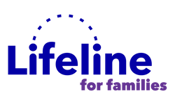Our Commitment to Equity in Mental Health
At Lifeline for Families, we aim to increase access to equitable mental health care by examining our own biases, ensuring representation from all voices, and conducting research that promotes diversity, equity, and inclusion (DEI) in mental health care. We are also using data-driven decision-making to promote systems change. In this way, we are working to address barriers to equitable care for pregnant and postpartum individuals, children, and their families.

Diversity, Equity, and Inclusion in Mental Health Care:
What We’re Doing
We’re committed to working to address inequities in perinatal and child mental health due to racism and other systems of oppression.
As research and understanding grow, care standards for perinatal individuals, youth, and families are constantly evolving and improving. But racism, implicit biases, and health inequities in mental health remain. That’s why it’s critical to integrate diversity, equity, and inclusion into mental health care interventions, protocols, and approaches from their inception.
Here are some examples of what we’re doing
Mental Health Equity Research Projects
Our team is pursuing several projects focused on integrating DEI in our Network of Perinatal Psychiatry Access Programs, research, programming, and trainings. Examples include:
Resources for Integrating Mental Health into Obstetric Settings
Our suite of resources for integrating perinatal mental health care into obstetric settings empower obstetric practices to integrate perinatal mental health care into their everyday workflow. We are applying for a grant to adapt and revise our resources to:
- Include anti-racism training
- Address unmet social needs
DEI Mental Health Research Projects
The Lifeline for Families team includes trainees and PhD students who are dedicating their careers to promoting equity within mental health care. DEI mental health research topics they’re pursuing include:
- Inequities in perinatal mental health care for individuals who are Black, Indigenous, Latina/o/e/x, Asian, Asian American, and Pacific Islander
- Allostatic load (measure of the health effects of chronic stress over time and generations) of Black pregnant and postpartum individuals compared to white pregnant and postpartum individuals
- Qualitative studies to elucidate the views of perinatal care professionals and individuals with lived experiences regarding ways to address inequities in perinatal mental health care
- Mixed methods and qualitative studies that aim to quantify and understand what Perinatal Psychiatry Access Programs are and can be doing to promote perinatal mental health equity
- Qualitative studies with our Lifeline for Moms' National Network of Perinatal Psychiatry Access Programs to gather perspectives on challenges and opportunities to advance perinatal mental health equity
Patient-Centered Outcomes Research Institute (PCORI) Engagement Award
We are building a patient-centered outcomes and comparative effectiveness research agenda for our Network of Perinatal Psychiatry Access Programs and other system-level interventions. A critical next step in this evolution is partnerships with:
- Black, Indigenous, Latina/o/e/x, Asian, Asian American, and Pacific Islander individuals with lived experiences of maternal mental health and substance use disorders
- Maternal health equity advocates
- Health equity researchers
The Eugene Washington PCORI Engagement Awards program honored us with a 2021 Engagement Award for our proposed solution. Future PCORI/CER studies need to be responsive to the mental health needs of constituencies underserved by our health care systems. Our solution relies on the hypothesis that focused conversations with community partners are necessary to build the capacity for this responsiveness.
Our engagement of partners in this project embraces the 7Ps Framework of Stakeholder Engagement. This framework identifies the individual or groups responsible for or affected by health- and health care-related decisions contributing to the maternal mortality crisis among Black and Indigenous communities. To do this, we have convened 3 Advisory Councils composed of community partners, including:
- Perinatal individuals from communities underserved by our mental health and health care systems
- Obstetric and childbirth professionals that serve these communities (i.e., perinatal professionals)
- Mental health equity advocates, professional societies, policymakers, partners or caregivers, and disparities researchers
Advisory Councils, Advisory Board, and Workgroups
We are working to ensure representation from all voices on our Lifeline for Moms Advisory Councils and Lifeline for Kids Advisory Board and workgroups. These groups facilitate collaboration and partnerships with the individuals we aim to serve, including those from marginalized and underserved communities. We listen to and address their concerns and incorporate their ideas.
We also partner with equity-focused organizations in our Advisory Councils, which include payors, policymakers, and advocacy organizations. By considering and addressing all perspectives, we can better develop and test equitable interventions.
Culturally-Responsive Trauma-Informed Training
Lifeline for Kids focuses on reaching trauma-impacted youth who have been marginalized. We have also improved access to evidence-based treatments for youth of color and children in bilingual families. Part of this commitment involves prioritizing specialized training, outreach, and access solutions on:
- Lesbian, Gay, Bisexual, Transgendered, and Questioning (LGBTQ) youth populations
- Court-involved youth who are disproportionately youth of color
- Other populations placed at greater risk, such as Commercially Sexually Exploited Children
We continue to make culturally-responsive modifications to trainings, treatments, and services. These modifications increase engagement and ensure that every child receives the best care possible.
For example, we incorporate advanced training modules adapted and enhanced to support culturally-responsive care in our Trauma-Focused Cognitive-Behavioral Therapy Learning Communities. They help mental health agencies and clinicians reach children disproportionately affected by trauma as well as higher degrees of access to care barriers, such as:
- Children with developmental delays or disabilities
- Latina/o/e/x children and families
- Transition age youth
As part of our commitment to anti-racism across our programming, we also incorporate anti-racism materials into our professional trauma-informed care trainings. These National Child Traumatic Stress Network (NCTSN)-developed materials include:
- Addressing Race and Trauma in the Classroom: A Resource for Educators
- Cultural Responsiveness to Racial Trauma infographic
Read NCTSN’s Position Statement on Racial Injustice and Trauma: African Americans in the U.S.
LINK-KID: A Centralized Referral Service
In 2012, Lifeline for Kids developed LINK-KID, an innovative referral system for Massachusetts youth who experience trauma. LINK-KID utilizes feedback loops to identify communities most in need of additional services and supports and to minimize care gaps.
For example, when data indicated that children in Spanish-speaking families were waiting the longest for services, we focused our efforts to provide outreach to bilingual and multilingual providers. We also offered free training in Spanish to increase workforce capacity and improve the quality of culturally-responsive care.
DEI Across Our Network of Perinatal Psychiatry Access Programs
We’re focused on developing resources and tools to help our Perinatal Psychiatry Access Programs promote equity within and across our programs. Our efforts include an equity incubator group and its related activities. Learn more about our commitment to equity across our Network of Perinatal Psychiatry Access Programs.
Equitable Language
As recommended by American Medical Association (AMA), we're working to reduce stigmatization and marginalization through the language choices we make in all our work, including this website. For example, we use the term “perinatal individual” because not all pregnant and postpartum individuals identify as women. We will also continue to use the term “maternal” when appropriate, recognizing that women are also population that has been marginalized.
Learn more about the AMA’s work embedding and advancing equity across all aspects of health care: Advancing Health Equity: A Guide to Language, Narrative, and Concepts.

